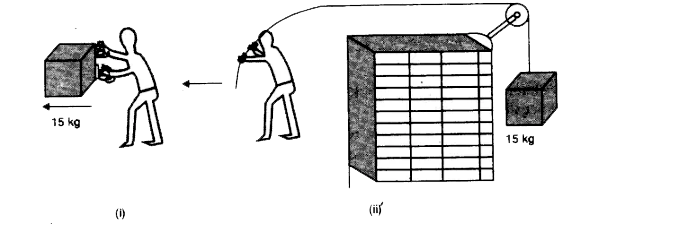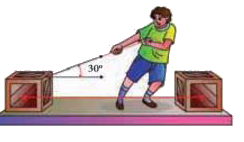Answer the following:
a) The casing of a rocket in flight burns up due to friction. At whose expense is the heat required for burning obtained? The rocket or the atmosphere?
b) Comets move around the sun in highly elliptical orbits. The gravitational force on the comet due to the sun is not normal to the comet's velocity in general. Yet the work done by the gravitatonal force over every complete orbit of the comet is zero. Why?
c) An artificial satellite orbiting the earth in very atmosphere loses its energy grdually due to dissipation against atmospheric resistance, howerver small. Why then does its speed increase progressively as it comes closer and closer tothe earth? d)In fig i) the man walks 2m carrying a mass of 15 kg on his hands. In Fig ii) he walks the same distance pulling the rope behind him. The rope goes over pulley, and a mass of 15 kg hangs at its other end. In which case is the work done greater?
 Solution in Tamil
Solution in Tamil
In the second case.
Topper's Solved these Questions
- WORK, ENERGY AND POWERBOOK - NCERT TAMILCHAPTER - WORK, ENERGY AND POWEREXERCISE - EXERCISES (ADDITIONAL EXERCISES)
7 Videos
- WORK, ENERGY AND POWERBOOK - NCERT TAMILCHAPTER - WORK, ENERGY AND POWEREXERCISE - EXAMPLE
36 Videos
- WORK, ENERGY AND POWERBOOK - NCERT TAMILCHAPTER - WORK, ENERGY AND POWEREXERCISE - EXERCISE - IV. NUMERICAL PROBLEMS
5 Videos
- WAVESBOOK - NCERT TAMILCHAPTER - WAVESEXERCISE - EVALUATION(IV. NUMERICAL PROBLEMS)
7 Videos
Similar Questions
A bullet of mass 0.012 kg and horizontal speed 70ms−1 strikes a block of wood of mass 0.4 kg and instantly comes to rest with respect to the block. The block is suspended from the ceiling by thin wire. Calculate the height to which the block rises. Also, estimate the amount of heat produced in the block.
View SolutionA box is pulled with a force of 25 N to produce a displacement of 15 m. If the angle between the force and displacement is 30∘, find the work done by the force.

View SolutionCalculate the work done by a force of 30 N in lifting a load of 2kg to a height of 10m (g=10ms−2)
View SolutionThe speed of a wave in a certain medium is 900 m/s. If 3000 waves passes over a certain point of the medium in 2 minutes, then compute its wavelength?
View SolutionAnswer the following:
a) The casing of a rocket in flight burns up due to friction. At whose expense is the heat required for burning obtained? The rocket or the atmosphere?
b) Comets move around the sun in highly elliptical orbits. The gravitational force on the comet due to the sun is not normal to the comet's velocity in general. Yet the work done by the gravitatonal force over every complete orbit of the comet is zero. Why?
c) An artificial satellite orbiting the earth in very atmosphere loses its energy grdually due to dissipation against atmospheric resistance, howerver small. Why then does its speed increase progressively as it comes closer and closer tothe earth? d)In fig i) the man walks 2m carrying a mass of 15 kg on his hands. In Fig ii) he walks the same distance pulling the rope behind him. The rope goes over pulley, and a mass of 15 kg hangs at its other end. In which case is the work done greater?

View SolutionAnswer the following:
a) The casing of a rocket in flight burns up due to friction. At whose expense is the heat required for burning obtained? The rocket or the atmosphere?
b) Comets move around the sun in highly elliptical orbits. The gravitational force on the comet due to the sun is not normal to the comet's velocity in general. Yet the work done by the gravitatonal force over every complete orbit of the comet is zero. Why?
c) An artificial satellite orbiting the earth in very atmosphere loses its energy grdually due to dissipation against atmospheric resistance, howerver small. Why then does its speed increase progressively as it comes closer and closer tothe earth? d)In fig i) the man walks 2m carrying a mass of 15 kg on his hands. In Fig ii) he walks the same distance pulling the rope behind him. The rope goes over pulley, and a mass of 15 kg hangs at its other end. In which case is the work done greater?

View Solutionकिसी रॉकेट का बहाय आवरण उड़न के दौरान घर्षण के कारण जल जाता है। जलने के लिए आवश्यक उष्मीय ऊर्जा किसके व्यय पर प्राप्त की गई-रॉकेट या वातावरण?
View SolutionThe casting of a rocket in flight burns up due to friction. At whose expense the heat energy required for burning obtained ? The rocket or the atmosphere ,or both /
View SolutionAnswer the following :
Comets move around the sun in highly elliptical orbits. The gravitational force on the comet due to the sun is not normal to the comet's velocity in general. Yet the work done by the gravitational force over every complete orbit of the comet is zero. Why?
View SolutionAnswer the following : The casing of a rocket in flight burns up due to friction. At whose expense is the heat energy required for burning obtained ? The rocket or the atmosphere?
View SolutionAnswer the following :
Comets move around the sun in highly elliptical orbits. The gravitational force on the comet due to the sun is not normal to the comet's velocity in general. Yet the work done by the gravitational force over every complete orbit of the comet is zero. Why?
View SolutionAnswer the following :
Comets move around the sun in highly elliptical orbits. The gravitational force on the comet due to the sun is not normal to the comet's velocity in general. Yet the work done by the gravitational force over every complete orbit of the comet is zero. Why?
View SolutionAnswer the following : The casing of a rocket in flight burns up due to friction. At whose expense is the heat energy required for burning obtained ? The rocket or the atmosphere?
View SolutionComets move around the sun in highly elliptical orbits . The gravitational force on the comet due to the sun is not normal to the comet's velocity in general. yet the work done by the gravitational force over energy complete orbit of the comet is zero . Why ?
View SolutionStatement - A : Heat energy required for burning a case of rocket in flight is obtained from the rocket itself and not from the atmosphere
Statement - B : work done by the gravitational force (conservative force) of the sun over a closed path in every complete highly elliptical orbit of the comet is zero
View SolutionThe spring of a rocket in flight burns up due to friction .At whose expense is the heat energy required for burning obtained ? The rocket or the atmosphere ?
View Solution
